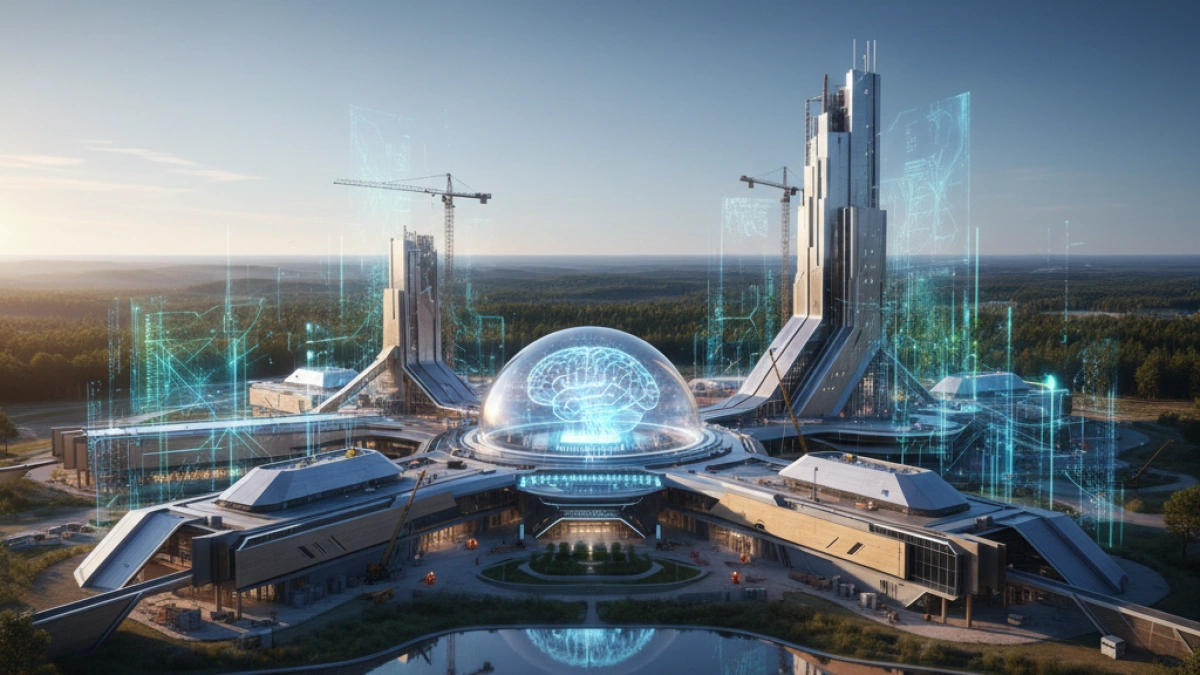Microsoft is building the largest AI campus in Wisconsin, set to be completed in 2026


Microsoft is taking a monumental step into the future of artificial intelligence with the construction of a vast campus in Wisconsin, expected to be operational by 2026. This development aligns with the company's strategy to lead the AI sector, incorporating advanced technology and a design focused on efficiency and performance.
A Large-Scale Campus
This new campus, which will cover more than 100 acres, will have a built area of approximately 110,000 square meters. The enormous scale of this project is specifically designed to support large-scale artificial intelligence operations, thereby differentiating itself from traditional data centers. It is not a place for hosting emails or websites, but a center focused on training and executing complex AI models that power applications like ChatGPT or Copilot.
To carry out this ambitious project, Microsoft has committed an initial investment of $3.3 billion. According to the company, its goal is for the campus to achieve a performance ten times greater than that of the world's fastest supercomputer today, emphasizing that competition in the AI field is centered on increasing computational power.
The Materialization of the Cloud
The Fairwater campus, as it is named, not only represents a technological advancement; its physical construction is a true milestone in the building of data centers. This project is founded on robust foundations, including 75 kilometers of foundation piles, 12,000 tons of steel structure, 193 kilometers of medium-voltage electrical wiring, and 117 kilometers of mechanical piping.
Read also
Satya Nadella, CEO of Microsoft, has stated that Fairwater will be a key strategic point for managing the increasing energy demands and computing capacity required by AI applications. The physical infrastructure consists of concrete, steel, pipes, and cables that extend deeply underground, to ensure that artificial intelligence operates continuously and efficiently.
A Sophisticated Cooling System
Cooling is one of the biggest challenges in managing data centers, and in the case of Fairwater, it becomes even more critical due to the high density of chips that it will host. Wisconsin experiences extreme weather, with temperatures dropping below 0 °C in winter and exceeding 25 °C in summer, necessitating a system that operates efficiently across a wide range of climatic conditions.
Microsoft has decided to implement a closed-loop liquid cooling system that allows for the reuse of water without waste and has been designed to ensure that more than 90% of the campus's capacity operates using this method. The facility will also feature the world's second-largest water chiller plant and 172 six-meter-tall fans, which complement the cooling system by dissipating accumulated heat in the data center.
Read also
Outstanding Capacity and Performance
The Fairwater campus has been designed not only for construction but will also incorporate an impressive set of technical capabilities. Each rack in the system integrates 72 NVIDIA Blackwell GPUs, which are connected via NVLink and NVSwitch to share up to 1.8 terabytes per second of data, accessing 14 terabytes of pooled memory. Although the company has not specified the exact number of racks it will host, it is mentioned that it will consist of "hundreds of thousands of accelerators" in total.
These systems will work together to operate as a supercomputer capable of processing 865,000 tokens per second, exemplifying the magnitude of the project. Furthermore, Fairwater will be part of a global network of interconnected AI data centers via Azure's Wide Area Network.
Challenges and Promises of the Project
Despite the vast promises of performance, the Fairwater project remains a work in progress, and many of its goals will need to be measured in the future when it begins operations. The company has indicated that the campus is expected to offer performance that surpasses up to ten times that of the most powerful supercomputers currently available when it commences operations in 2026. However, it has not yet specified which supercomputer this comparison refers to.
The technical components of the campus are designed to ensure constant support for large volumes of data, eliminating bottlenecks in processing. With a total capacity in exabytes, and storage systems that are comparable in size to "five football fields," this data center promises to handle more than two million read and write operations per second. In addition, a proprietary system has been developed to optimize data access, ensuring that the GPUs are always operational and ready for intensive processing.
In summary, Fairwater represents an ambitious manifestation of how physical infrastructure can support an era dominated by artificial intelligence. Its dimensions and technical capabilities are a clear indication of the transformation that Microsoft seeks to promote in the technology industry.
The future of AI is advancing rapidly, and the Fairwater campus is a reflection of what is to come. For more news and developments on technology and its impact, readers are invited to continue exploring my blog.



















